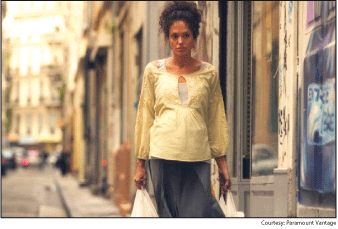By Steven Snyder
There’s a primary and secondary effect to Michael Winterbottom’s taut, documentary style in “A Mighty Heart.” The primary effect is that this story about the abduction, search for, and beheading of Wall Street Journal reporter Daniel Pearl is rendered remarkably intense, depicting this hostage scenario as a grueling, gripping, earth-shattering affair.
The secondary effect, though, is that the movie gradually comes to work as a two-hour buildup to one woman’s emotional collapse. As the story constantly zigs this way and that, between strategies and theories, focusing on a team that’s simultaneously juggling a police investigation, a public relations nightmare and a geopolitical drama, there is a constant sense of momentum that comes to a dead stop when the word is finally heard that Pearl is dead. And as the news reaches his wife, Mariane (Angelina Jolie), and she briskly walks into her bedroom and closes the door, all that momentum comes crashing down in a scene of sobbing and whaling, screaming and pleading.
It is one of the most horrifying images that I have ever seen in a film — the image of this woman, mourning the death of her husband (and she still has yet to learn how he died). For only the second time in recent memory — the other instance being Todd Field’s brilliant “In the Bedroom,” the best film of 2001 — I found myself consciously looking away from the movie screen, believing I had no right to see this woman at this point in her life, to have access to her heart in this way.
Given that impulse, it’s safe to say that the image of Jolie the superstar completely evaporates here, as she submerges herself into the part of Mariane. “A Mighty Heart” is her story, and her story alone, and while the movie does indeed work as a thriller, it’s more the tale of a state of mind that is fierce and vigorous until it shatters into a million pieces.
By now, the story of Daniel Pearl has become something of a national wound — one of the most public scars of the ongoing war in Iraq. A reporter for the Journal, Pearl (played only in flashback during the movie by Dan Futterman) was duped by insurgents into believing he would be having a meeting with a high-level terrorist leader, but on the way to that meeting he was abducted, and shortly thereafter a set of demands were released by his captors.
“A Mighty Heart” is primarily about this period of desperate uncertainty, as Mariane and an array of American and Pakistani police and diplomats launched the imposing and, from the outset, seemingly-impossible mission of wading through the Pakistani underworld in hopes of learning more information about Pearl’s whereabouts. Working backwards, from cell phone calls to notes, and low-level terrorist operatives to leaders, the film is rapidly, furiously paced. Often resorting to shaky, hand-held cameras and mostly relying on longer takes that are quickly edited together, there is an immediacy to the film that draws us in, despite the fact that we already know their strategies and urgency will, in the end, prove fruitless.
What this documentary, almost cinema verite approach conveys, in crisp detail, is how passionately a group of people came together with a fixed goal, and how each was forced to cope with the prospect of failing. Mariane’s story is the most emotional, but she is only one in a parade of panicked, broken souls who were ravaged by this needless, barbaric act. And even though she is criticized in one scene for not appearing to be distraught enough over her husband’s abduction, “A Mighty Heart” details how she was in fact facing the brink of devastation, clinging desperately to the hope that this too might pass.
Why relive her story through a film? Because while we all watched the news broadcasts and read all the stories, we truly have no idea what it would be like to confront such evil in our own lives. And while we still can’t comprehend it as a movie audience, at least here we are given a moment to really contemplate it — and, in the case of Jolie’s emotional breakdown, to feel it course through our veins.



































